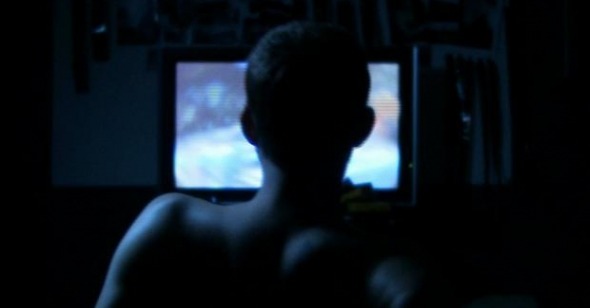A Fine Mess
By Jeannette Catsoulis
The Signal
Dir. David Bruckner, Jacob Gentry, and Dan Bush
If Paddy Chayefsky and Newton Minow had ever bonded over too many cocktails—secretly spiked by Neil Postman—the result might have been The Signal, a grungy warning to anyone who would rather watch than engage.
Television, however, isn’t the movie’s only maleficent medium. The signal in question—a crackling hiss of static and snow—beams with equally terrifying consequences from radios and cell phones, infecting its listeners with nonspecific, pathological rage. Exuberantly merging sci-fi, horror, and black comedy, three writer-directors each take responsibility for one third of the narrative; and if the outcome is more zealous than lucid that’s not to say the experiment lacks merit. There’s nothing like the combination of low budget and high anxiety for liberating the id.
Set in a slab-grey city with the dystopic name of Terminus, this breathlessly ambitious bloodbath unfolds over the course of one particularly stressful New Year’s Eve. Sliced into three distinct segments, or “transmissions,” of wildly varying tension and creativity, the film is most effective at the outset as David Bruckner’s aptly named “Crazy in Love” kicks off. With only a few, bleak scenes of smoothly escalating tension, Bruckner firmly establishes his twin trajectories of volatile love triangle and impending apocalypse—an impressive accomplishment when you consider his locations are limited to little more than a rumpled bed, a gloomy corridor, and a concrete parking garage.
While Mya (Anessa Ramsey) drives home to her loutish husband, Lewis (AJ Bowen)—leaving lover Ben (David Hyde-Pierce look-alike Justin Welborn) to twiddle exasperatedly with his remote—her path is strewn with random scenes of violence. Not especially perturbed (it is New Year’s Eve after all), Mya, sanity preserved by the headphones of her CD player, is slow to catch on even after Lewis and his buddies get to whacking each other: for all practical purposes, there’s no discernible difference between a husband made homicidal by technology and one who pretty much wants to kill you as a general principle.
Spousicide turns out to be a recurring theme in The Signal, where the only dependable relationship is one predicated on deception. Sliding into the second act, Jacob Gentry’s “The Jealousy Monster,” the film’s nerve-twanging tone gives way to one of blackest humor as lover and husband cross paths at the home of a chirpily married couple (Cheri Christian and Christopher Thomas). Bemoaning the fact that “anarchy has replaced etiquette,” their hosts take refuge in denial and the comfort of yuppie ritual even as their carpeting becomes increasingly blood-soaked. Tonally riskier and more performance-driven, Gentry’s slapsticky segment is much tougher to pull off; yet even as it strains our tolerance for quirk and craziness, its director reveals an offbeat comic timing that’s surprisingly endearing.
By the time we reach the final act, Dan Bush’s “Escape from Terminus,” the film’s splatter count has risen along with its sense of desperation. Bush makes a valiant attempt to restore tension and narrative coherence, but according to the press notes was forced to jettison his original screenplay when Bruckner made drastic, last-minute changes to the first act. Tasked with resolving a radically altered story, he resorts to power tools and dismemberment—all fun stuff, of course, but nowhere near as troubling as the carefully nurtured paranoia of the film’s early scenes.
Originally conceived as an experimental film project called Exquisite Corpse—in which a series of filmmakers would pass the narrative baton—The Signal is a slaphappy, low-rent hybrid of 70s exploitation and new-millennium zombie. Charging along with more enthusiasm than finesse, its makers have willingly renounced logic (the signal seems equally likely to induce catatonia as hyperthyroidal rage) in favor of self-gratification. But then again, who hasn’t?
